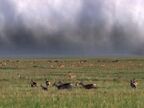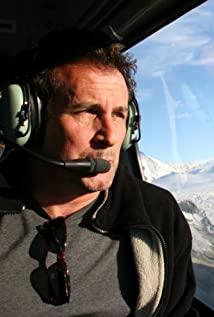In the polar day, in the northern hemisphere, the ice layer that had been frozen for half a year began to melt, and the thin ice surface could no longer support the cumbersome polar bear. When the ice surface was completely broken into floes scattered in the sea, undulating ice, blue sea, a white bear shuttled through it, enjoying the long-lost sunshine and the quiet uproar. This picture, a full 3 minutes, is pleasing to the eye.
In fact, this is also people's reverie for this "comfortable beauty". Awakening from hibernation, it ventured into the deep sea of floes in search of food. When the poor polar bear lay on the tidal flat, his eyes looked helplessly at the sea. The lines explain that without food, the bear will face the threat of death. I thought, if I were the photographer at the time, would I go and save it? Help, mercy and mercy, I can save a life. But reason says that this is natural selection and that man has no right to interfere. Maybe, saving an individual, but unknowingly destroying a population. I can see the sorrow and death of a bear, but in the unseen north, there are more vigorous and lovely lives, and they also have the sorrow of life and death. If I were there, I would still be conflicted and unable to decide.
In the polar night, in the southern hemisphere, the aurora seems to flicker in the eternal night sky, and the dark green reflects the glaciers and snow-capped mountains. The male penguins huddled tightly together to keep warm, slowly changing the shape of the group, taking turns taking turns to take turns the penguins with the wind and the snow on the edge, so as to survive the long and cold half-year-long dark night, so as to protect the penguin eggs in the belly bag . The power of crowds, the power of love. When the sun returns to the south again, the exhausted penguin is looking forward to warmth, the birth of a young child, and the return of a maternal partner. Life once again ushered in hope and love. In that distant cold and harsh environment, these are enough to inspire us to live, to abandon the darkness and yearn for the light.
After reading it, calm down. I think, in this life, I will go to live beyond 66°33' north latitude for more than half a year (it is estimated that the southern hemisphere is impossible, unless I chose the major of marine geology that year), 7-8 months, one person or two people. I like the day, love the orange-red sunset, but fear the night. Specifically, the process of being afraid of darkening. So I want to experience the feeling that half a year is only daytime, and the sun is roaming in the sky, and there may be that kind of sunset feeling. As for the remaining 2 months, I use it to enjoy the aurora and starry sky. If I immerse myself in the dark night for half a year, I may not be able to stand it.
I have been pondering the real reason for yearning for the desolate land, which may be due to the eternal beauty of the desolate land, which has never changed, which can somewhat satisfy the abnormal desire for law and stability in my heart. I found that recently I am reluctant to contact new things, read new books, or watch movies and TV series with new plots, and only want to revisit the novels I have read and the movies I have seen. In addition, is to keep learning, in order to be satisfied. Perhaps, this is the lowest level of desire for negative entropy as a living being.
The real reason needs to be considered.
View more about Planet Earth reviews










